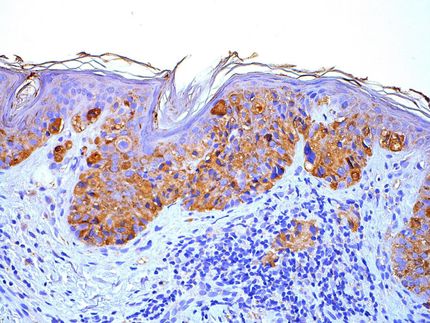FDA Grants Approval for avelumab
First Immunotherapy Approved for Metastatic Merkel Cell Carcinoma
Merck and Pfizer Inc. announced that the US Food and Drug Administration (FDA) has approved BAVENCIO® (avelumab) Injection 20 mg/mL, for intravenous use, for the treatment of adults and pediatric patients 12 years and older with metastatic merkel cell carcinoma (mMCC). This indication is approved under accelerated approval based on tumor response and duration of response. Continued approval for this indication may be contingent upon verification and description of clinical benefit in confirmatory trials. BAVENCIO will be co-commercialized by EMD Serono, the biopharmaceutical business of Merck in the US and Canada, and Pfizer. BAVENCIO was developed, reviewed and approved through the FDA’s Breakthrough Therapy Designation and Priority Review programs.
BAVENCIO, a human anti-PD-L1 antibody, is the first FDA-approved therapy for patients with mMCC. Metastatic MCC is a rare and aggressive skin cancer, with fewer than half of patients surviving more than one year and fewer than 20% surviving beyond five years. “At the heart of this FDA approval is our drive to make a meaningful difference for patients with hard-to-treat cancers like metastatic Merkel cell carcinoma,” said Belén Garijo, CEO Healthcare and Member of the Executive Board of Merck. “BAVENCIO’s journey has included years of hard work – from the scientists who discovered this molecule in our labs, to our alliance with Pfizer and to the study participants and investigators worldwide. We are grateful to all who have made it possible for us to bring this important new treatment option to patients.”
“Today is a significant milestone for people fighting metastatic Merkel cell carcinoma, who until now have not had any options beyond chemotherapy,” said Albert Bourla, Group President, Pfizer Innovative Health. “This approval demonstrates the power of collaboration to accelerate meaningful new choices for cancer patients.”
“Merkel cell carcinoma is rarer than some of the more well-known skin cancers, however, it’s very aggressive and the proportion of people who die from MCC is much higher than that of people with melanoma,” said Deborah S. Sarnoff, MD, President of the Skin Cancer Foundation. “With this approval, I believe there is new hope for people and their families touched by this rare form of skin cancer.”
The efficacy and safety of BAVENCIO was demonstrated in the JAVELIN Merkel 200 trial, an open-label, single-arm, multi-center study conducted in 88 patients with histologically confirmed metastatic MCC whose disease had progressed on or after chemotherapy administered for distant metastatic disease. Sixty-five percent of patients were reported to have had one prior anti-cancer therapy for metastatic MCC and 35% had two or more prior therapies. The major efficacy outcome measures were confirmed overall response rate (ORR) according to Response Evaluation Criteria in Solid Tumors (RECIST) v1.1 as assessed by a blinded independent central review committee (IRC) and IRC-assessed duration of response.
The overall response rate (ORR) was 33% (95% confidence interval [CI]: 23.3–43.8%). Eleven percent of patients experienced a complete response (95% CI: 6.6-19.9%) and 22% of patients experienced a partial response (95% CI: 13.5-31.7%). Tumor responses were durable, with 86% of responses lasting for at least six months (n=25). Forty-five percent of responses lasted at least 12 months (n=13). Duration of response ranged from 2.8 to over 23.3 months.
The warnings and precautions for BAVENCIO include immune-mediated adverse reactions (such as pneumonitis, hepatitis, colitis, endocrinopathies, nephritis and renal dysfunction, and other adverse reactions), infusion-related reactions and embryo-fetal toxicity. The most common adverse reactions (reported in at least 20% of patients) included fatigue (50%), musculoskeletal pain (32%), diarrhea (23%), nausea (22%), infusion-related reactions (22%), rash (22%), decreased appetite (20%) and peripheral edema (20%). For more information, please see Important Safety Information for BAVENCIO below.
BAVENCIO is designed to potentially engage both the adaptive and innate immune systems. By binding to PD-L1, BAVENCIO is thought to prevent tumor cells from using PD-L1 for protection against white blood cells, such as T-cells, exposing them to anti-tumor responses. BAVENCIO has been shown to induce antibody-dependent cell-mediated cytotoxicity (ADCC) in vitro.
BAVENCIO is available for order now in the US.























































